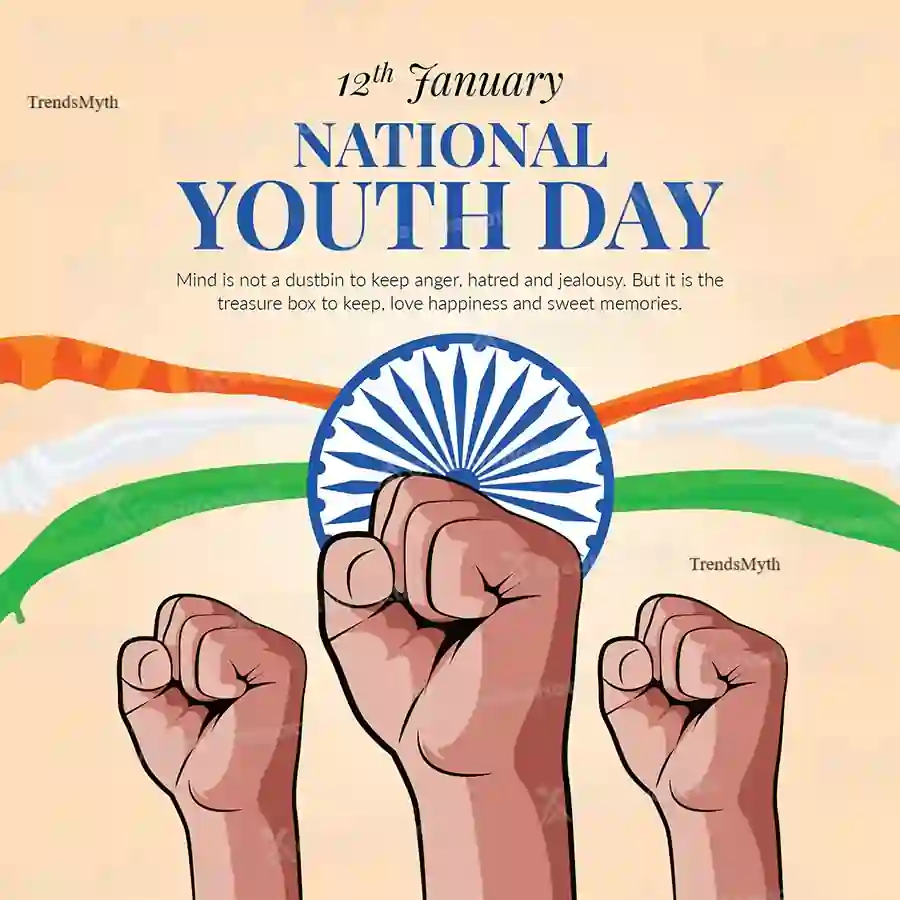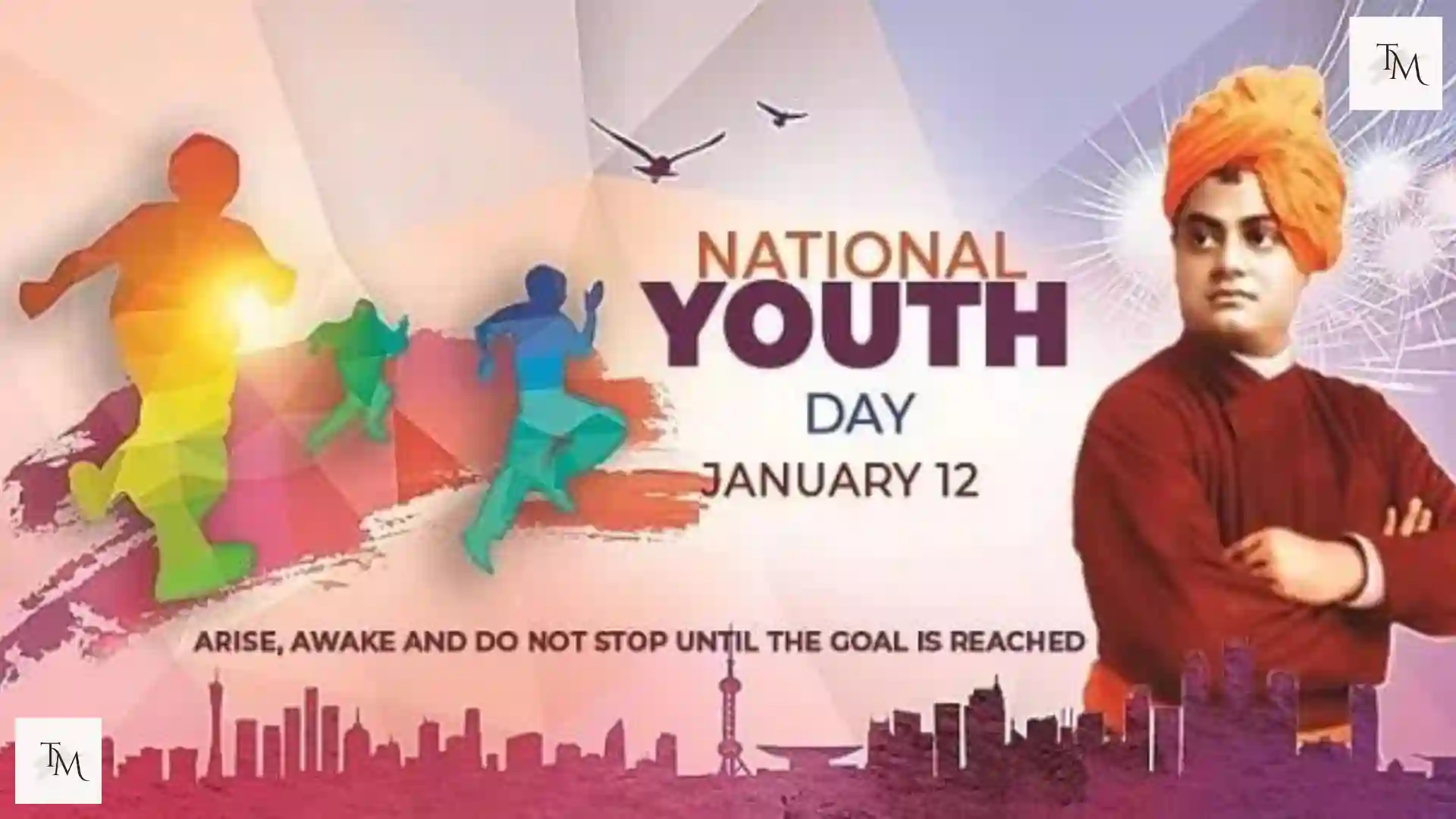National Youth Day is also known in India as Swami Vivekananda Jayanti. It’s a celebration that resonates with the energy, potential and aspirations among the young people of India.
This day, observed on the 12th of January each year, has special significance as it commemorates Swami Vivekananda, one of India’s influential spiritual leaders.
This day not only celebrates the birth and influence of Swami Vivekananda but also gives youth a chance to be recognized for their role in the future of India. Learn more about National Youth Day, also known as Swami Vivekananda Day.
On Whose Birthday Is National Youth Day Celebrated?
Swami Vivekananda was born in 1863 on the 12th of January. He was a monk and a prominent figure who introduced Vedanta to the rest of the world. His teachings were based on tolerance, spiritual harmony and the recognition that everyone is a divine being.
The Indian government declared the birthday of Swami Vivekananda as National Youth Day in 1984 to honour his ideals and inspire the youth.
Swami Vivekananda Jayanti is a day that has great significance because it encourages the younger generation to think about Swami Vivekananda and apply his teachings to their own lives.

His focus on developing physical, mental and spiritual strength aligns with the aspirations of modern youth who navigate a rapidly changing world.
This day celebrates youth and their potential to positively contribute to society, promote unity, uphold Swami Vivekananda’s values, etc.
Why is National Youth Day Celebrated?
Swami Vivekananda is a legendary figure in Indian history. He symbolism spirituality and wisdom and is a catalyst for social change. Narendranath Datt was born on the 12th of January, National Youth Day.
From a young, curious mind to a spiritual luminary worldwide, it is an odyssey that has left traces on India’s philosophical and cultural landscape.
Swami Vivekananda’s teachings are deeply rooted in Vedanta principles. This ancient Indian philosophy explores the unity between the self and ultimate reality.
His powerful oratory skills and ability to articulate made him an influential speaker, and his message resonated with youth in the late nineteenth century. He wanted to share spiritual knowledge and integrate it into everyday life to foster the holistic growth of individuals.
Vivekananda’s historic speech at the World’s Parliament of Religions in Chicago in 1893 marked a pivotal moment. His opening words, “Sisters, brothers of America”, not only captured the audience but also transcended geographic boundaries, emphasising the universality of his message.
He spoke about tolerance, acceptance and the importance of understanding between diverse cultures and religious beliefs. His words left an indelible mark on the world stage.
Swami Vivekananda’s philosophy stressed each soul’s divinity and the importance of self-realisation. He believed education should be centred on holistic development, including physical, mental and spiritual dimensions.
His teachings encouraged a whole generation to achieve excellence, harness their inner strengths, and contribute to the welfare of society.
In India, the transformative philosophy of Swami Vivekananda has inspired the celebrations of National Youth Day and Swami Vivekananda’s birthday. In 1984, the government recognized the need to channel youth energy and enthusiasm.
It declared the date of Swami Vivekananda’s birth as National Youth Day. In 1984, the government announced Swami Vivekananda’s birth date, National Youth Day.
It was intended to pay tribute to the visionary monk and embed his teachings in the fabric of national consciousness. This was especially true for the younger generation.
Swami Vivekananda’s National Youth Day ideas and quotes serve as a way to inspire youth to explore their full potential. Seminars, workshops and cultural events are held to celebrate the day.
The themes include self-discovery and leadership. Vivekananda called for courage, integrity and commitment to service, values that remain relevant today just as they did in his day.

Themes and Messages
Swami Vivekananda’s teachings, encapsulated by his profound philosophy and offering timeless wisdom, resonate with generations.
They speak to the core of existence, making them so powerful. We can see that the messages and themes conveyed by the visionary monk are still relevant today.
Self-realisation is a significant theme of Swami Vivekananda’s teachings. He stressed the importance of understanding your true nature and recognizing divinity in yourself.
Vivekananda’s teachings are a way for people to find inner strength and authenticity in a modern context where peer pressure, societal expectations and the fast pace of life often cause a feeling of disconnection.
Vivekananda’s emphasis on education to achieve holistic development is a recurrent theme. He believed that education shouldn’t be limited to academic knowledge but should also encompass a person’s physical and spiritual dimensions.
His message is a reminder that a well-rounded, character-building education is essential in the current era where knowledge tends to be specialised.
Vivekananda taught me a lot about fearlessness. He encouraged people to overcome their fear, which was the source of all misery.
The call to boldness in a world battling uncertainty, rapid change, and evolving problems is particularly poignant. Vivekananda’s message of courage and resilience can inspire today’s youth facing many choices and fate.
Vivekananda’s philosophy includes an appeal for empathy and social service. He believed true spirituality manifests itself in the selfless service of humanity.
This message is especially relevant in an age marked by social injustices, environmental concerns and global crises. Vivekananda-inspired youth can play a crucial role in tackling societal challenges by demonstrating kindness, compassion and engagement with the community.
Vivekananda’s central teaching is that all creatures are divine. In today’s interconnected and globalised world, his message of tolerance and acceptance for all paths to spiritual realisation is vital. Vivekananda’s teachings instil a spirit that is inclusive and accepting of all ways to spiritual realisation and foster a sense of unity amongst diversity.
Vivekananda also placed a high value on the integration between science and spirituality. He believed science and spirituality were complementary, not opposing paths to understanding the universe. Vivekananda encourages youth in an age of technological advances and scientific progress to foster a holistic life.
A single text or speech at National Youth Day cannot adequately address Swami Vivekananda’s ideas. This philosophy is intended to instil in the minds and lives of our youth.
Activities
National Youth Day is more than a simple commemoration in India. It is a celebration marked by an array of activities and events that reflect the energy and enthusiasm of India’s youth.
Education institutions, youth organisations, and communities participate actively in various initiatives that honour Swami Vivekananda’s legacy and encourage the child to engage positively and contribute to society.
Educational institutions are vital in organising events to foster a deeper understanding of Swami Vivekananda’s teachings and their relevance today.
Seminars and workshops explore the philosophical side of Swami Vivekananda’s ideas. They encourage students to reflect upon fearlessness, self-realisation and holistic education.
These events are designed to inspire a sense of purpose and responsibility in the youth. They will be motivated to contribute to social development actively.
Youth organisations are inspired by National Youth Day to organise various activities catering to diverse talents and interests. These events, which range from cultural festivals to environmental initiatives and sports competitions, showcase the many facets of youth.
These activities celebrate the intellectual and creative prowess and energy of young people while also encouraging them to work together and achieve constructive goals.
Community organisation-oriented outreach programs and activities celebrate National Youth Day. Health camps, cleanliness campaigns, and awareness campaigns are often undertaken to address local concerns and improve the wellbeing of communities.
The day is a catalyst to instil a sense of community and social responsibility within the youth. It inspires them to become active contributors towards the betterment of society.
The National Cadet Corps and other youth organisations mark National Youth Day. The train is a great way to show the spirit of patriotism, discipline and leadership among youth.
This parade represents the young generation’s commitment to Swami Vivekananda and National Youth Day and their dedication to the nation’s welfare.
Cultural events form an essential part of the National Youth Day celebrations. They reflect India’s rich heritage and diversity. Dance performances, music concerts, and theatre presentations are often the main events, giving young artists a chance to show off their talent.
These events are not only entertaining, but they also provide a way to communicate the timeless messages of Swami Vivekananda.
Educational institutions also organise debates, essay writing and elocutions on topics related to Swami Vivekananda’s philosophy.
These competitions promote critical thinking, research and articulate expression among youth, encouraging a deeper understanding of Swami Vivekananda’s teachings.
Youth Empowerment Initiatives
National Youth Day, or Swami Vivekananda Jayanti, is more than just a celebration of Swami Vivekananda’s birthday. It has evolved into a dynamic celebration for our nation’s youth through various empowerment initiatives.
The government-led programs emphasise entrepreneurship and skill development, reflecting the commitment to equipping youth with essential abilities.
Non-governmental organisations contribute to developing leadership and cross-cultural communication, fostering a holistic approach to youth empowerment.
Youth-led projects addressing societal issues, such as food waste reduction, promoting menstrual hygiene, and environmental sustainability, have a remarkable impact. Listed below are a few of the initiatives:
Government Initiatives
1. Skill India Mission
- Initiative Overview Launched by the Ministry of Skill Development and Entrepreneurship in India, Skill India is a program that aims to train millions of Indian youth to be job-ready.
- Success story: Many success stories are highlighted by individuals who have gained skills through Skill India in various sectors, from healthcare to IT, resulting in meaningful employment.
2. Startup India
- Startup: India is an ambitious program that supports and nurtures innovative startup companies in multiple sectors.
- Success Story: Many youth-led startups have flourished under the Startup India initiative, including Byju’s Ola and Paytm. They have contributed significantly to the economy of the country.
3. Pradhan Mantri Kaushal Vikas Yojana (PMKVY):
- Initiative Overview: PMKVY, the flagship initiative of the PMKVY program, provides financial rewards for training in skills that will enhance employment and livelihood opportunities.
- Success Story: People from rural and urban areas transformed their lives by acquiring PMKVY skills ranging from traditional crafts to modern industry.
Non-Government Initiatives:
1. Youth Alliance for Leadership and Development in Africa – YALDA ):
- Initiative Overview: YALDA is a youth-led African organisation focusing on leadership development and service to the community.
- Success Story: YALDA empowered many young leaders to initiate impactful projects in their communities, ranging from healthcare programs to education initiatives.
2. AIESEC:
- AIESEC: It is a youth-led global organisation that fosters leadership development and cross-cultural interaction opportunities.
- Success Story: AIESEC has helped young people contribute to various social projects worldwide, including environmental sustainability, poverty reduction, and education.
Youth-Led Projects:
1. Robin Hood Army
- Project Overview: An organisation of professionals who collect surplus food from restaurants to distribute it to needy people.
- Impact: The Robin Hood Army operates in several countries and has served millions of meals. This shows how youth-led initiatives can address both food waste and hunger at the same time.
2. Project Baala
- Project Overview: A youth-led initiative to address menstrual hygiene by providing affordable and sustainable sanitary items.
- Impact: Project Baala positively impacts many young girls’ lives, ensuring they have access to menstrual hygiene products and breaking social taboos.
3. Green the Gene
- Project Overview: A youth-led environmental initiative that focuses on conservation and sustainable development.
- Impact: Green the Gene is involved in tree planting drives, waste management campaigns and awareness campaigns. This has demonstrated the transformative power of youth-led environmental initiatives.
The Challenges Facing Today’s Youth
The dynamic celebration of Swami Vivekananda in India goes beyond the simple acknowledgement of the birthday of Swami Vivekananda.
The festival is an excellent opportunity to explore the opportunities and challenges that influence the lives of youth in the country, aligning them with the ideals and values of empowerment, resilience and societal contributions. On National Youth Day, let’s examine youth’s challenges and consequences.
- Technological Overload Challenge: Youth struggle with digital addiction and information overload.
- Impact: It is essential to balance the positives and negatives of technology, as it can affect mental health and relationships.
- Uncertainty in the Economy:Challenge: An unstable job market and uncertain economic conditions present challenges to securing stable employment and financial independence.
- Impact: Youth face stress and anxiety. They need to be resilient and adaptable to achieve their goals.
- Global Challenges: Youth are exposed to global challenges such as climate change, pandemics, and geopolitical tensions.
- Impact: To meet these challenges, youth must be more aware and have greater responsibility. This aligns with the themes of National Youth Day.
- Education PressuresChallenge: The intense competition for educational resources pressures academic performance, career decisions, and social expectations.
- Impact: Youth struggle with mental health issues and the need for holistic education and personal wellbeing.
- Social PressuresChallenge: Stereotypes, social expectations and peer pressures can contribute to matters related to mental health, self-identity and body image.
- Impact: To navigate these pressures, resilience and self-acceptance are required. This aligns with the Self-realisation principles emphasised on Youth Day.
Opportunities to Grow as a Person and Society:
- Digital ConnectivityDigital era offers global connectivity, collaboration and knowledge sharing.
- Impact: Youth can use these opportunities to develop skills, create positive social change and achieve personal growth. This is in line with the ideals for global citizenship.
- Entrepreneurship and InnovationOpportunity: Today’s landscape encourages innovation, entrepreneurship and startups.
- Impact: Youth are encouraged to explore and create new opportunities for economic independence. They can also contribute to the growth of society by developing innovative solutions that align with National Youth Day themes.
- Global Citizenship: Youth can become citizens by advocating and contributing to global issues.
- Impact: Participating in global issues promotes a responsibility that aligns with the principles of service for humanity, highlighted during National Youth Day.
- Education Transformation:Opportunities: As the educational landscape changes, it encourages a variety of learning methods, skills development and vocational training.
- Impact: Youth can customise their education according to their interests. This fosters a holistic learning approach and prepares them for a dynamic workplace.
- Advocacy and activism: Social media platforms allow youth to participate in activism and advocacy, raising awareness of various causes and mobile.
- Impact: Youth can influence policy changes and social change by actively participating in societal issues. This aligns with National Youth Day’s call for fearlessness and societal responsibility.
How To Truly Celebrate Swami Vivekananda Jayanti & His Legacy:-
National Youth Day is more than a day to reflect on the opportunities and challenges facing today’s youth. It calls for active participation. Engagement is the key to empowerment, and now is the time for children to take control of their destiny.
Youth-led initiatives can be local or global and provide a way to make a real difference. Take advantage of the transformative potential of your skills, ideas and passion.
Connect with organisations to promote entrepreneurship, social justice, and environmental sustainability. Your voice will resonate.
You can contribute to the growth of society by actively engaging in community development. This also embodies Swami Vivekananda’s teachings.
This call to act is a catalyst to help youth become optimistic change architects. Break free from the chains of fear and embrace limitless opportunities. National Youth Day is more than a celebration;
It’s an invitation to help shape the narrative for the future. Your actions should reflect the values of fearlessness and service to humanity. Engaging in meaningful initiatives will inspire others and create ripples beyond your personal growth.
Conclusion
National Youth Day is more than just an annual celebration; it’s a beacon that guides the future of our nation. The challenges highlighted underscore the importance of proactive engagement. And the opportunities provide a canvas on which the youth can create a resilient and innovative legacy.
In celebrating the ideals embodied in Swami Vivekananda, it is evident that youth are not only torchbearers for tomorrow but also architects who shape the contours of the present.
Education is the only way to provide them with direction. Ketto SIP is a Monthly Giving Program that allows you to contribute as little as Rs 100 per month and send an entire child to school. You are giving them the gift of dreaming and a brighter and more promising future.
National Youth Day instils a responsibility, a real realisation youth aren’t passive recipients of society but active participants.
This is an invitation to embrace principles such as fearlessness and self-self-realisation service to mankind. Youth can create narratives that promote progress through individual and collective efforts, creating an empathy-driven world.
Youth is at the centre of the possibilities. They are equipped with the tools necessary to create change. National Youth Day is more than a day; it’s a movement fueled by each individual’s dynamism and promise.
ALSO READ: LAKSHADWEEP VS MALDIVES: WHICH PLACE IS BETTER FOR VACATIONS










